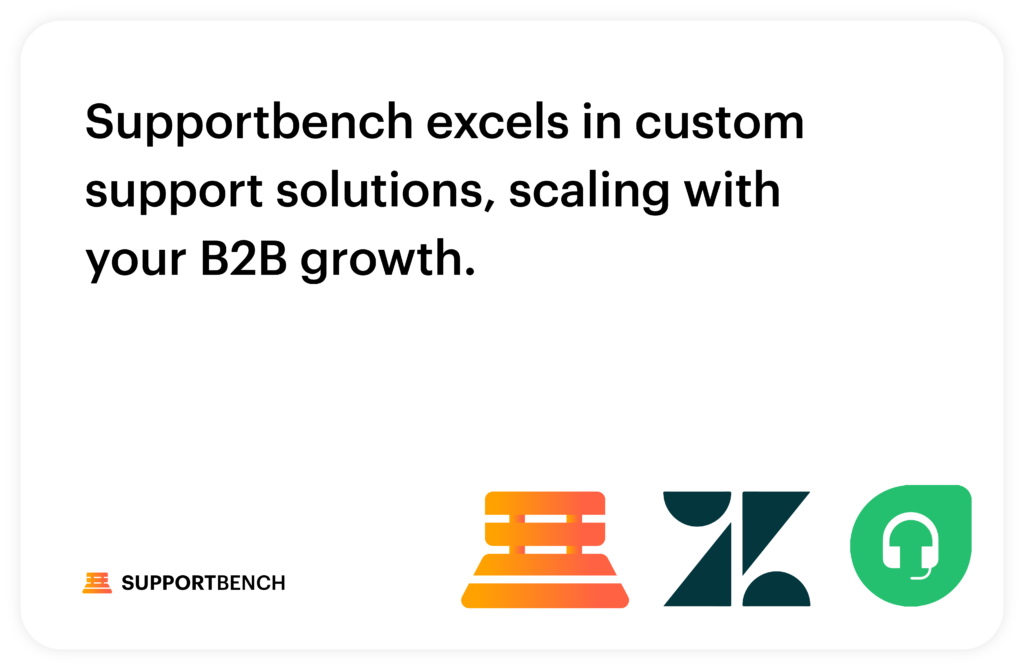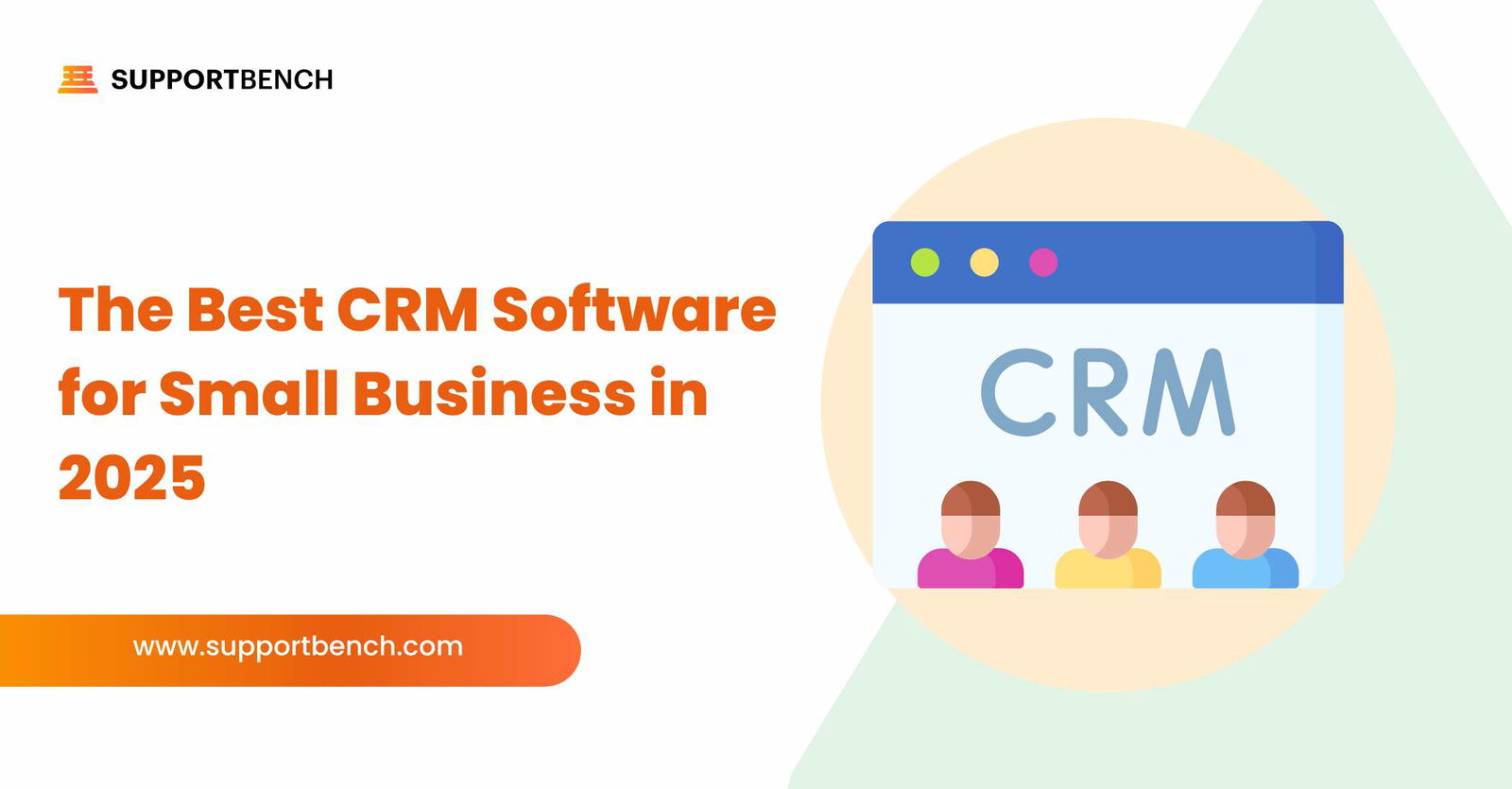Customer Support is no longer just a function of an organization; it’s a pivotal part of a business’s success story. Enterprises are constantly on the lookout for a platform that not only meets their current needs but also adapts and scales with future demands. In this detailed comparison, we delve into three leading customer support platforms: Zendesk, Freshdesk, and Supportbench, focusing on customization, flexibility, and pricing, with an in-depth analysis of all 3 of why Supportbench stands out as the premium choice for B2B Companies.

Customization: A Comparative Overview
Zendesk
Zendesk is lauded for its intuitive interface, which at first glance, seems to simplify the user experience. But while Zendesk is efficient for standard operations, its core platform sometimes falls short in offering deep customization and handling any type of real complexity. For intricate enterprise processes, such as complex ticket routing, specific reporting needs, or unique customer interaction flows, the platform often requires additional plugins or integrations. This not only adds to the overall cost but can also complicate the system, leading to potential issues with software updates or integration compatibility.
And, for Zendesk to achieve more advanced customization, businesses frequently turn to Zendesk’s marketplace for third-party applications. While this extends its functionality, it means businesses must rely on multiple, often high-priced vendors for a fully customized solution, further complicating support and maintenance.
Freshdesk
Freshdesk offers a range of customization options. Its tools for ticketing, automation, and basic reporting can be somewhat tailored to suit the general needs of these organizations. However, as businesses scale up or as their processes become more complex, Freshdesk’s customization capabilities are not keeping pace. Larger enterprises with specific needs for workflow management, advanced analytics, or highly customized customer support journeys are finding Freshdesk’s offerings a bit too rigid or simplistic. This simplicity works to potentially under-serve more complex, nuanced enterprise requirements.
Supportbench
Supportbench is designed with a deep understanding of the diverse and complex needs of larger enterprises. It offers extensive customization capabilities far beyond basic ticketing and reporting. Companies can easily tailor nearly every aspect of their customer support experience. This includes detailed control over workflows, user interfaces, and interaction patterns, enabling a level of customization that aligns perfectly with specific business processes and customer engagement strategies.
Supportbench stands out with features like custom data fields, detailed customer journey tracking, and advanced analytics. These tools allow businesses to not only respond to customer needs but also to anticipate them, creating a more proactive support environment. Unlike platforms that require multiple third-party integrations for advanced functionality, Supportbench offers a comprehensive suite of features within its core platform. This integration reduces the need for external applications, streamlining both the user experience and backend processes.
Flexibility and Scalability: A Key Differentiator
Zendesk
Zendesk’s primary approach to flexibility lies in its marketplace of apps and integrations. This allows businesses to pay to add specific functionalities as needed. However, this dependence on third-party integrations for flexibility means that the core platform may not always align seamlessly with every unique business requirement. And, while integrations provide adaptability, they can also introduce complexity and potential integration challenges. For companies with highly specific or constantly evolving needs, relying on a patchwork of integrations can be less efficient and may lead to difficulties in maintaining a streamlined support process. Also, as companies grow and their support needs become more complex, the limitations of the core Zendesk platform in terms of custom workflows, advanced reporting, and specific industry requirements immediately become apparent.
Freshdesk
Freshdesk’s user interface is well suited to Companies with very standard support processes. But, it faces challenges when scaling up for larger enterprises or more complex support requirements. The platform’s structure, while efficient for smaller operations, may not offer the depth of customization or advanced features needed by larger organizations. Freshdesk’s flexibility is more aligned with standard support operations and does not fully accommodate the dynamic, multifaceted needs of larger enterprises, particularly those with specific industry demands or rapidly changing support environments.
Supportbench
Supportbench is designed with a core emphasis on adaptability and scalability. This makes it uniquely positioned to handle not just the current needs of a Company but also its future growth and evolution. Unlike platforms that primarily rely on external integrations for flexibility, Supportbench’s native features include comprehensive customization options, advanced analytics, and the ability to manage complex, multi-tiered support strategies. Also, Supportbench’s architecture is built to scale, capable of handling increasing ticket volumes, diverse support channels, and intricate customer relationship management needs. This scalability is crucial for businesses targeting rapid growth or operating in industries where customer support demands can change quickly. And, by providing advanced features as part of the core platform, Supportbench ensures that businesses are equipped to adapt to future challenges and market changes without the constant need to seek out and integrate new solutions.
Pricing Models: A Detailed Comparison
In terms of pricing, all three platforms offer tiered pricing structures, but there are significant differences:
Zendesk
Zendesk operates on a per-agent pricing model, so the cost scales with the number of support agents using the platform. While this model can be cost-effective for smaller teams, it becomes increasingly expensive as the number of agents grows. And often, to access more advanced features or integrations, companies are required to opt for more expensive tiers. This can significantly increase the overall cost, especially for large enterprises or those requiring sophisticated support tools. The integrations and add-ons required by Zendesk, are often essential for complex operations, and most certainly come with additional costs, further escalating the total expenditure.
Freshdesk
Like Zendesk, Freshdesk also follows a per-agent pricing structure. However, as the business grows and more agents are added, the cost increases. Additionally, accessing more advanced features or higher support tiers also requires moving to more expensive plans. For companies with growing needs, balancing the required features with the escalating costs can become a challenge, potentially leading to compromises in functionality or support quality.
Supportbench
Supportbench distinguishes itself with a pricing model that prioritizes value and comprehensive feature access. Unlike the per-agent models, Supportbench’s pricing is structured to be more inclusive, offering a wider range of features at each pricing tier. This approach allows companies, especially larger enterprises or those with complex support needs, to access a full suite of features without the cost scaling disproportionately with the number of agents. And, as much as possible, Supportbench aims for transparent pricing, reducing the need for additional expenditures on integrations or advanced features. This not only makes budgeting more predictable but also ensures that companies can fully utilize the platform’s capabilities without incurring unexpected costs.
Cost-Effectiveness and Company Impact
For small and growing businesses, Supportbench’s model allows access to advanced features early on, which can be crucial for establishing effective support practices without the financial strain of per-agent pricing models. And, larger enterprises benefit from the scalability of Supportbench’s pricing model. As the number of support agents increases, the cost does not become a barrier to maintaining or expanding the quality of customer support.
It’s important to note that cost-effectiveness isn’t just about the price. It’s about what you get for that price. Supportbench’s model ensures that companies of all sizes get the most value, with a comprehensive set of features accessible at every tier.
Conclusion
While Zendesk and Freshdesk have their merits, particularly for more simple workflows or those with straightforward support needs, Supportbench emerges as the superior choice for more complex companies with evolving support requirements. Its unparalleled customization, inherent flexibility, scalability, and cost-effective pricing model position it as a strategic asset for businesses. Supportbench isn’t just a tool; it’s a comprehensive solution that empowers support teams, enhances customer experiences, and drives organizational success in the competitive landscape of customer support. By focusing on seamless customer support management, data-driven optimization, and scalable infrastructure, Supportbench is positioned as the ideal partner for businesses aiming to elevate their customer support experience and drive growth.
In the end, the choice of a customer support platform should align with a company’s current needs and future aspirations. Supportbench’s comprehensive approach to customization, flexibility, scalability, and pricing makes it the standout choice for businesses looking to excel in customer support and grow seamlessly in today’s dynamic market environment.












